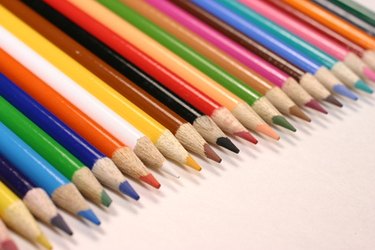Things You'll Need
Graph paper
Colored pencils
Pencil

Native-American Indians were greatly influenced by the introduction of European glass beads during the 17th century. Each bead was sewn individually to an item to create a design prior to the invention of a bead loom. The bead loom provided a way to make a large flat patterned design that resembled a piece of fabric. Patterns for bead loom designs can be made using a sheet of graph paper. Each square on the graph paper represents one bead.
Step 1
Use a graphite pencil to trace the lines on a piece of graph paper that represent the outside edges of the bead design. Example: The seed bead weaving is 10 beads wide and 100 beads long. Mark the outside edges of the pattern design so it is 10 squares wide by 100 squares long.
Video of the Day
Step 2
Use a graphite pencil and lightly draw the desired design within the pattern border. Use a kneaded eraser to make any changes. The kneaded eraser will erase graphite lines without leaving eraser pieces on the paper.
Step 3
Color the drawn graphite design with colored pencils to indicate the color of each bead to use when weaving.
Tip
All patterns will have a block style edge. Keep this is mind when creating the pattern. Straight lines are easily made but curves are not possible on the majority of looms. Looms that allow for curved lines do not allow for straight lines.
Tape graph paper together to create the desired length and width for the bead loom pattern. The pattern size is limited by the minimum and maximum width size of the bead loom.
Video of the Day